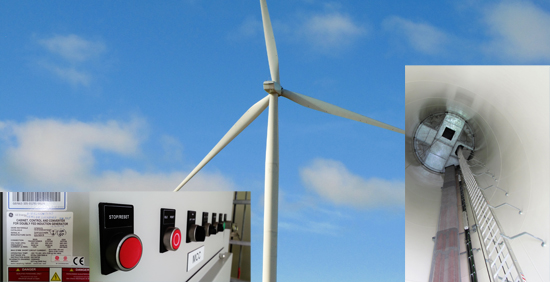Students take a field trip to a wind farm
“The trip made me more aware of some of the practical things … like the sound of the turbines, and how they alter the look of the land.”

 Enlarge
Enlarge
Students in Prof. Ian Hiskens’ Electricity Networks and Markets (EECS 598) class and members of his research group recently took a field trip to DTE Energy Company’s first company-owned wind farm, called Echo. Prof. Hiskens wanted to give his students a deeper understanding of the reality and challenges of alternative energy. They left with a better sense of how these giant 3-pronged windmills serve as energy hubs, as well the challenges involved in implementing renewable energy.

 Enlarge
Enlarge
“The trip was fascinating,” said Jonas Kersulis, an electrical engineering PhD student in his first year at Michigan. “There is much more to a wind turbine than meets the eye. When you get inside, you see that each turbine has its own pulley system and backup lighting for workers, and there is a lot of equipment in there as well.”
Each of the 70 turbines constructed at DTE’s Echo Wind Farm come with a $3-5M price tag, and feed into three substations. They could only be built after years of careful planning that required navigating “dozens of city and state laws and a hundred landowner leasing agreements,” according to Jonas.
Jonas came to Michigan to work with Prof. Hiskens as a member of his research group. He has dreams of one day starting a global company that will make use of his expertise in power and energy. For example, knowing how truly inadequate the nation’s grid is to accommodate renewable energy could inform his ability to create novel solutions for developing countries.
Jonathon Martin attended the field trip as a member of the class; he is also a PhD student in Prof. Hiskens’ research group. He began reading articles about renewable energy in high school, intrigued that there could be a way to produce energy with fewer negative side effects than traditional methods.
“The trip made me more aware of some of the practical things you don’t think about, like the sound of the turbines, and how they alter the look of the land,” said Jonathon. It is especially the latter that can make wind energy a tough sell, despite their obvious advantages over living next to a traditional power plant. He’d like to continue working on energy optimization and with wind farms after leaving Michigan.
The incorporation of renewable generation into electricity markets is only one small facet of Prof. Hiskens’ course. The course covers the principles and practices that underpin reliable and economical operation of power systems. It discusses how electricity markets are run, the buying and selling of energy, how energy generation is scheduled, how energy loads are balanced, and compares various energy markets. [more info about EECS 598: Electricity Networks and Markets]
The photos above were taken by Jonas Kersulis during their field trip to Echo Wind Farm.
 MENU
MENU 
